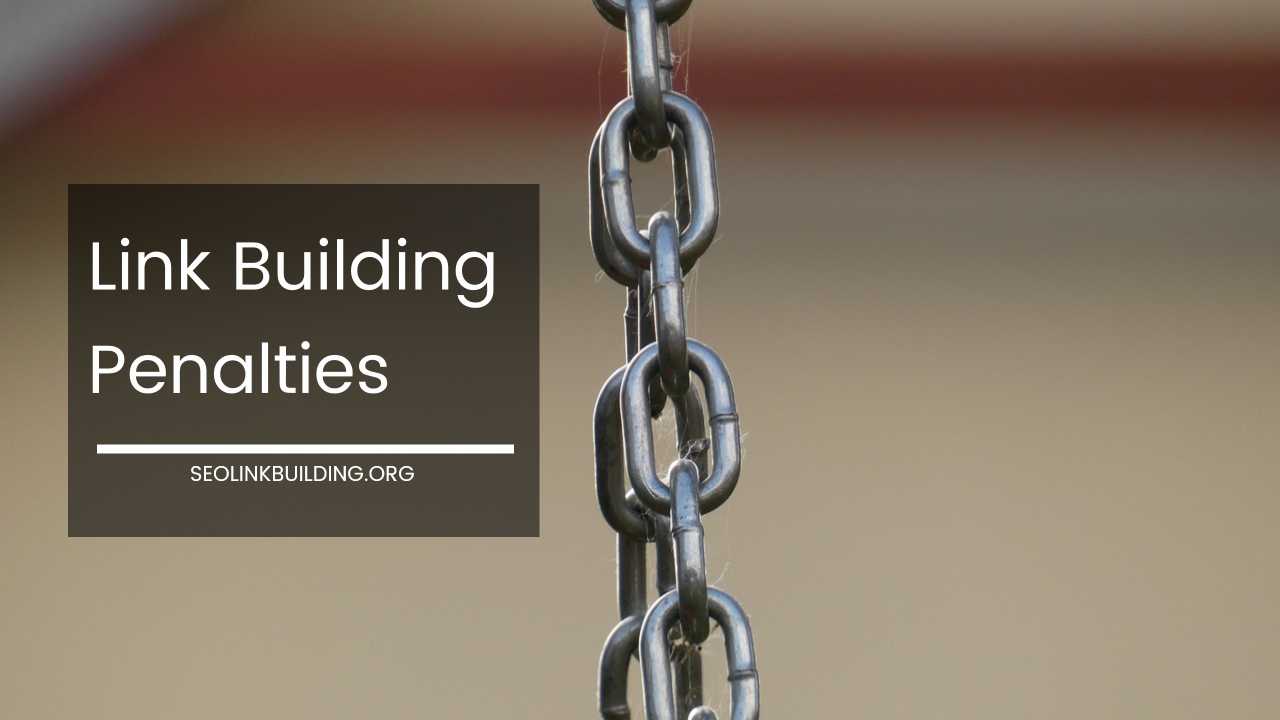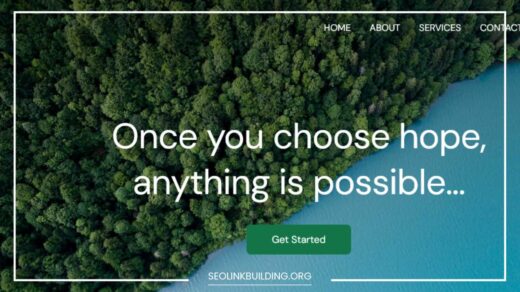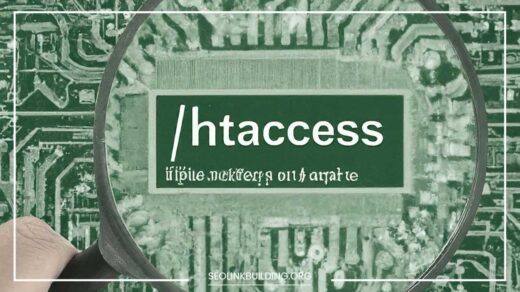Avoiding Link Building Penalties: Strategies for White-Hat SEO

Link Building Penalties: The Dark Side of SEO
Link building is a cornerstone of Search Engine Optimization (SEO). High-quality backlinks from relevant websites act as votes of confidence, boosting your website’s authority and credibility in the eyes of search engines like Google.
However, there’s a fine line between ethical link building and manipulative practices. Engaging in spammy tactics can lead to dreaded link building penalties, causing your website to plummet in search rankings or even disappear from search results entirely.
This article delves into the world of link building penalties, exploring their types, causes, and the devastating consequences they bring.
We’ll also equip you with the knowledge to avoid these penalties and build a healthy, natural link profile that attracts organic traffic and propels your website to SEO success.
Understanding Link Penalties: Why They Happen
Search engines like Google strive to deliver the most relevant and valuable results to their users. Link building plays a crucial role in this process, as backlinks indicate a website’s trustworthiness and expertise.
However, manipulative link-building schemes can distort this system.
Link penalties occur when search engines detect practices that violate their webmaster guidelines. These guidelines outline what constitutes high-quality links and what practices are considered manipulative.
When a website engages in tactics like buying links, participating in link networks, or stuffing content with irrelevant keywords to attract backlinks, it raises red flags for search engines.
Here are the two main types of link penalties:
- Algorithmic penalties: These are automated penalties triggered by search engine algorithms that identify unnatural link patterns. The most well-known example was Google’s Penguin update, specifically designed to target websites with low-quality backlinks. These penalties can be difficult to detect as they may not be explicitly communicated by the search engine. However, a noticeable drop in rankings and organic traffic can serve as a red flag.
- Manual penalties: These are issued by human reviewers at search engines after a thorough analysis of a website’s link profile. Search engines like Google may send a notification via Search Console informing you of the penalty and the specific violations identified. Manual penalties are typically more severe and require a more complex recovery process.
The Devastating Impact of Link Building Penalties
Link penalties can have a crippling effect on your website’s SEO performance. Here’s what you can expect:
- Plummeting search rankings: One of the most immediate consequences is a significant drop in search rankings. The websites you worked hard to outrank might suddenly disappear from sight, leaving your target audience unable to find you.
- Loss of organic traffic: Lower rankings translate to a dramatic decrease in organic traffic, the lifeblood of most websites. This decline in visitors can severely impact your leads, conversions, and ultimately, your revenue.
- Damaged reputation: A link penalty can tarnish your website’s reputation. Visitors might perceive your site as untrustworthy or spammy, leading to a loss of credibility and brand value.
- Long recovery process: Recovering from a link penalty can be a lengthy and challenging process. It involves identifying and disavowing bad links, building high-quality backlinks, and potentially requesting reconsideration from search engines. This process can take months, and there’s no guarantee of complete recovery.
Common Causes of Link Building Penalties
Now that we understand the severity of link building penalties, let’s explore the common practices that can trigger them:
- Buying links: Purchasing links from irrelevant websites or link farms is a clear violation of search engine guidelines. These links lack credibility and are easily detected by search engines.
- Link exchanges: Excessive link exchanges where websites simply trade links with each other are another red flag. These links often lack context and appear unnatural. Focus on building genuine relationships and earning links organically.
- Low-quality directories: Submitting your website to low-quality directories with minimal editorial review can negatively impact your link profile. Search for industry-specific directories with high domain authority and a good reputation.
- Guest posting on spammy websites: While guest posting can be a valuable link-building strategy, it’s crucial to choose reputable websites relevant to your niche. Posting on spammy websites with poor content can lead to penalties. Look for websites with engaged audiences and a good backlink profile.
- Keyword stuffing: Stuffing your website’s content with irrelevant keywords in an attempt to attract backlinks is not only bad for user experience but can also trigger penalties. Create high-quality content that provides value to your audience and naturally attracts links.
- Cloaking: Hiding content from search engines while displaying something different to users is a deceptive practice that can lead to penalties. Search engines prioritize user experience, and cloaking undermines this principle.
Building a Healthy Link Profile: The White Hat Approach
Here are some essential tips to build a robust and natural link profile that avoids penalties:
-
Focus on high-quality content: Create valuable, informative, and engaging content that establishes your website as a thought leader in your industry. This naturally attracts backlinks from other websites who want to share your insights with their audience. Conduct thorough keyword research to understand the topics your target audience is searching for, and create content that addresses their needs and pain points
-
Become a valuable resource: Develop resources that other websites will find helpful and informative. This could include industry reports, white papers, infographics, or case studies. When you create valuable resources, other websites are more likely to link to them as a reference for their readers.
-
Build relationships with influencers: Developing relationships with industry influencers can lead to valuable backlinks and brand mentions. Identify key influencers in your niche and engage with them on social media, comment on their blogs, or offer to collaborate on a project. Building genuine connections can lead to organic link opportunities.
-
Broken link building: Identify broken links on relevant websites within your niche and offer your content as a replacement. This provides value to the website owner by fixing a broken link and earns you a backlink. Utilize tools like Ahrefs or SEMrush to find broken link opportunities.
-
Get listed in industry directories: Submit your website to high-quality, relevant industry directories. These directories can be a good source of backlinks, but ensure they are reputable and have a good domain authority. Focus on directories that are specific to your niche and have a targeted audience.
-
Internal linking: While external backlinks are crucial, internal linking also plays a significant role in SEO. Create a user-friendly website structure with proper internal linking. This helps search engines understand the hierarchy of your content and distribute link equity throughout your website.
-
Monitor your backlinks: Regularly monitor your backlink profile to identify any potential issues. There are various backlink monitoring tools available, such as Google Search Console, Ahrefs, and Moz. These tools can help you identify low-quality backlinks that might be harming your website’s SEO.
Recovering from a Link Penalty: The Road to Redemption
If your website has unfortunately been hit with a link penalty, don’t despair. There are steps you can take to recover and regain your lost rankings:
- Identify the bad links: The first step is to identify the low-quality backlinks that triggered the penalty. Use backlink monitoring tools to analyze your backlink profile and flag suspicious links.
- Disavow the bad links: Disavowing links informs search engines that you do not endorse these links and that they should not be considered when evaluating your website’s authority. Google Search Console provides a disavow tool to upload a list of links you want to disavow.
- Remove the bad links (if possible): If possible, reach out to the website owners and request them to remove the link pointing to your website. This approach can be time-consuming, but it’s the most effective way to address the issue.
- Build high-quality backlinks: Focus on building high-quality backlinks from reputable websites relevant to your niche. Implement the white-hat link building strategies mentioned earlier to attract organic links over time.
- Request reconsideration (for manual penalties): Once you’ve addressed the link issues and built a healthier backlink profile, you can submit a reconsideration request to the search engine (if you received a manual penalty). This request informs the search engine of the actions you’ve taken and demonstrates your commitment to following webmaster guidelines.
Final Thoughts: Building a Sustainable SEO Strategy
Link building is a crucial aspect of SEO, but it’s important to prioritize quality over quantity. By focusing on creating valuable content, building genuine relationships, and earning backlinks organically, you can build a sustainable SEO strategy that avoids penalties and drives long-term success.
Remember, SEO is a marathon, not a sprint. Consistent effort, high-quality content, and a white-hat approach will help you achieve your SEO goals and establish your website as a trusted authority in your niche.













